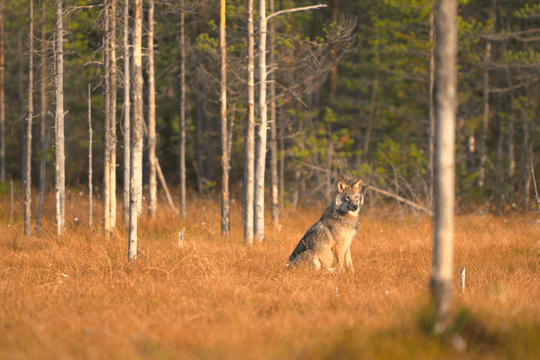
The European Commission has proposed a reduction in the protection of wolves across western Europe.
The suggestion involves downgrading the wolf’s status under the Berne Convention from “strictly protected” to “protected.” This shift comes after two decades during which the wolf has made a remarkable comeback in numerous countries, including Germany, Belgium, the Netherlands, and Denmark.
Ursula von der Leyen, the president of the commission, whose pony, Dolly, was killed by a wolf in Germany in 2022, said: “The comeback of wolves is good news for biodiversity in Europe. But the concentration of wolf packs in some European regions has become a real danger, especially for livestock. To manage critical wolf concentrations more actively, local authorities have been asking for more flexibility.”
The commission’s proposal, influenced by lobbying from farming groups and populist politicians critical of increasing wolf populations, has drawn criticism from conservationists and environmentalists. Nearly 300 conservation NGOs expressed concerns, emphasising that the current scientific assessment does not justify a change in protection for the wolf population in western Europe.
While there are approximately 20,000 wolves in western Europe, six of the nine transboundary wolf populations in the EU have not yet attained a favourable conservation status. This means that if wolves were culled or hunted, the population might not remain sustainable. Despite this, an opinion poll across 10 EU member states indicated that 68% of rural inhabitants and 65% of farmers supported continued strict protections for the wolf.
Agata Szafraniuk, the wildlife lead for the legal charity ClientEarth, warned that the commission’s proposal to modify existing laws sets a dangerous precedent for environmental protection and the rule of law.
She said: “The tabling of this proposal has been part of an irregular process. Opening a law and tinkering under the bonnet when it seems convenient sets a really poor precedent – and should raise the alarm about how well protected nature really is. If this proposal goes through, it would be a horrendous signal for how the commission responds to ambitious nature policies and laws when they’re actually successful.
“Laws like these are there to safeguard not only wildlife and its habitats, but European societies’ rights to a healthy environment and safe future.”
Léa Badoz of the Eurogroup for Animals said the European Commission was backtracking on previous commitments “with no scientific backing”. She said: “The proposal reflects a strategic, opportunistic and political move which raises concerns about its motivations and alignment with genuine policy objectives. We call on member states to consider scientific evidence as well as the strong support of rural communities.”
Changing the wolf’s protection status under the Berne Convention would require agreement from EU member states and other parties to the convention. Once agreed upon, the wolf’s protection could be downgraded at the EU level.
The EU’s habitats directive, implemented in 1992, granted the wolf the highest level of legal protection, a key factor in its successful return to western Europe. Under the directive, “problem” wolves that pose a threat to livestock can still be culled. However, certain EU member states, like Sweden and Finland, challenge EU law interpretations by culling wolves to maintain populations at a fraction of their natural level.
——————————————————————————
At Natural World Fund, we are passionate about stopping the decline in our wildlife.
The decline in our wildlife is shocking and frightening. Without much more support, many of the animals we know and love will continue in their decline towards extinction.
When you help to restore a patch of degraded land through rewilding to forests, meadows, or wetlands, you have a massive impact on the biodiversity at a local level. You give animals a home and food that they otherwise would not have had, and it has a positive snowball effect on the food chain.
We are convinced that this is much better for the UK than growing lots of fast-growing coniferous trees, solely to remove carbon, that don’t actually help our animals to thrive.
This is why we stand for restoring nature in the UK through responsible rewilding. For us, it is the right thing to do. Let’s do what’s right for nature!
Donate today at https://naturalworldfund.com/ and join in the solution!

